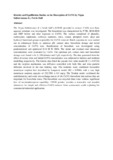Please use this identifier to cite or link to this item:
https://cris.library.msu.ac.zw//handle/11408/1668Full metadata record
| DC Field | Value | Language |
|---|---|---|
| dc.contributor.author | Nharingo, Tichaona | - |
| dc.contributor.author | Moyo, Mambo | - |
| dc.contributor.author | Mahamadi, Courtie | - |
| dc.date.accessioned | 2016-07-08T09:27:51Z | - |
| dc.date.available | 2016-07-08T09:27:51Z | - |
| dc.date.issued | 2015 | - |
| dc.identifier.issn | 1735-6865 | - |
| dc.identifier.uri | https://www.researchgate.net/publication/297685967 | - |
| dc.identifier.uri | http://hdl.handle.net/11408/1668 | - |
| dc.description.abstract | The Vigna Subterranean (L.) Verdc hull’s (VSVH) potential to remove Cr(VI) ions from aqueous solutions was investigated. The biosorbent was characterised by FTIR, SEM-EDX and XRF before and after exposure to Cr(VI). The surface comprised of phenolic, carboxylate, sulphonate, carboxyl, ammines, silica, silanol, phosphite esters, alkyl and hydroxyl functional groups responsible for Cr(VI) removal. Batch experiments were carried out in erlenmeyer flasks to optimize pH, contact time, biosorbent dosage and initial concentration of Cr(VI) ions. Reutilization of biosorbent was investigated using predetermined and optimized 0.14 M H2SO4. The initial and residual total chromium concentrations were estimated by FAAS. The optimum pH, contact time and biosorbent dosage were found to be 2, 180 minutes and 3 g/L respectively. The data generated from the effect of contact time and initial Cr(VI) concentration was subjected to kinetics and isotherm modelling respectively. The kinetic data fitted the pseudo first order model (R 2 = 0.9334) and the sorption mechanism was diffusion controlled with both film and intra particle diffusion involved in the rate limiting step. The isotherm study confirmed favourable monolayer sorption best described by Langmuir model (R2 = 0.9986) with a very high monolayer sorption capacity of 232.5581 ± 0.9 mg/g. The Temkin model confirmed the endothermicity and weak ion-exchange nature of the Cr(VI)-biosorbent interactions that are important for biosorbent reuse. The biosorbent was recycled three times without significant loss of sorption-desorption capability. VSVH powder provides a renewable and reusable alternative for simple and effective Cr(VI) removal from wastewaters worth exploring for commercial-industrial application. | en_US |
| dc.language.iso | en | en_US |
| dc.relation.ispartofseries | International Journal of Environmental Research;Vol. 10, No. 1; p. 85-96 | - |
| dc.subject | Bio-reduction, Cr(VI), Intra-particle diffusion, Kinetics, Reutilization | en_US |
| dc.title | Kinetics and equilibrium studies on the biosorption of Cr(VI) by vigna subterranean (L.) verdc hull | en_US |
| dc.type | Article | en_US |
| item.fulltext | With Fulltext | - |
| item.openairecristype | http://purl.org/coar/resource_type/c_18cf | - |
| item.languageiso639-1 | en | - |
| item.grantfulltext | open | - |
| item.openairetype | Article | - |
| item.cerifentitytype | Publications | - |
| Appears in Collections: | Research Papers | |
Files in This Item:
| File | Description | Size | Format | |
|---|---|---|---|---|
| Kinetics and Equilibrium Studies on the Biosorption of Cr.pdf | Abstract | 110.21 kB | Adobe PDF |  View/Open |
Items in MSUIR are protected by copyright, with all rights reserved, unless otherwise indicated.



